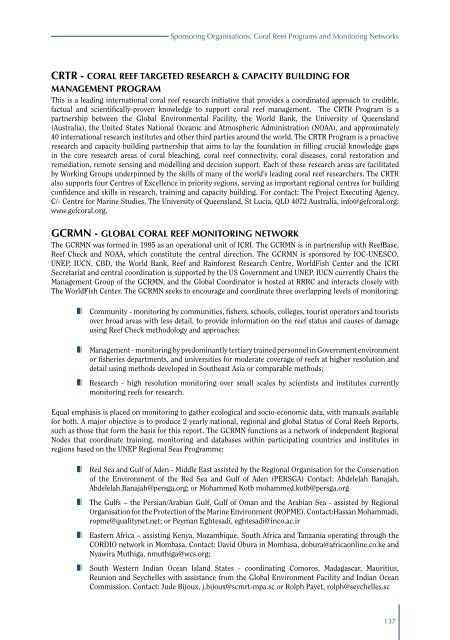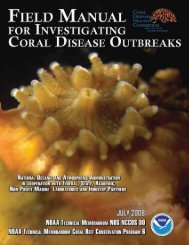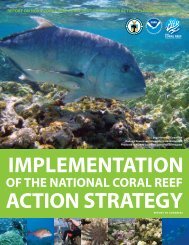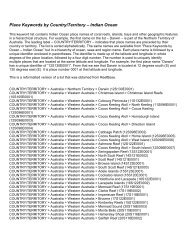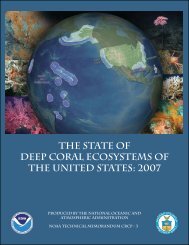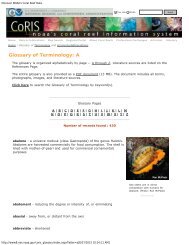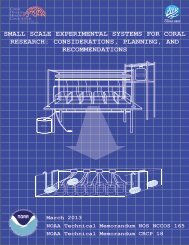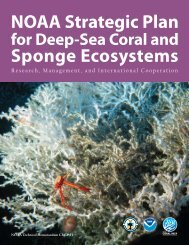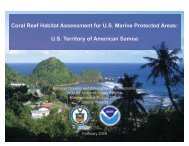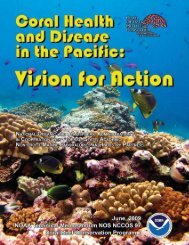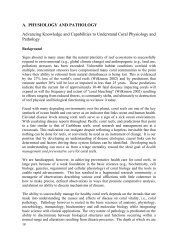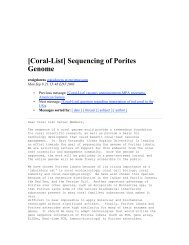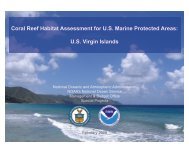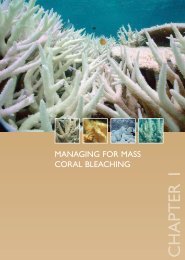Status of Caribbean coral reefs after bleaching and hurricanes in 2005
Status of Caribbean coral reefs after bleaching and hurricanes in 2005
Status of Caribbean coral reefs after bleaching and hurricanes in 2005
You also want an ePaper? Increase the reach of your titles
YUMPU automatically turns print PDFs into web optimized ePapers that Google loves.
Sponsor<strong>in</strong>g Organisations, Coral Reef Programs <strong>and</strong> Monitor<strong>in</strong>g NetworksCRTR - CORAL REEF TARGETED RESEARCH & CAPACITY BUILDING FORMANAGEMENT PROGRAMThis is a lead<strong>in</strong>g <strong>in</strong>ternational <strong>coral</strong> reef research <strong>in</strong>itiative that provides a coord<strong>in</strong>ated approach to credible,factual <strong>and</strong> scientifically-proven knowledge to support <strong>coral</strong> reef management. The CRTR Program is apartnership between the Global Environmental Facility, the World Bank, the University <strong>of</strong> Queensl<strong>and</strong>(Australia), the United States National Oceanic <strong>and</strong> Atmospheric Adm<strong>in</strong>istration (NOAA), <strong>and</strong> approximately40 <strong>in</strong>ternational research <strong>in</strong>stitutes <strong>and</strong> other third parties around the world. The CRTR Program is a proactiveresearch <strong>and</strong> capacity build<strong>in</strong>g partnership that aims to lay the foundation <strong>in</strong> fill<strong>in</strong>g crucial knowledge gaps<strong>in</strong> the core research areas <strong>of</strong> <strong>coral</strong> <strong>bleach<strong>in</strong>g</strong>, <strong>coral</strong> reef connectivity, <strong>coral</strong> diseases, <strong>coral</strong> restoration <strong>and</strong>remediation, remote sens<strong>in</strong>g <strong>and</strong> modell<strong>in</strong>g <strong>and</strong> decision support. Each <strong>of</strong> these research areas are facilitatedby Work<strong>in</strong>g Groups underp<strong>in</strong>ned by the skills <strong>of</strong> many <strong>of</strong> the world’s lead<strong>in</strong>g <strong>coral</strong> reef researchers. The CRTRalso supports four Centres <strong>of</strong> Excellence <strong>in</strong> priority regions, serv<strong>in</strong>g as important regional centres for build<strong>in</strong>gconfidence <strong>and</strong> skills <strong>in</strong> research, tra<strong>in</strong><strong>in</strong>g <strong>and</strong> capacity build<strong>in</strong>g. For contact: The Project Execut<strong>in</strong>g Agency,C/- Centre for Mar<strong>in</strong>e Studies, The University <strong>of</strong> Queensl<strong>and</strong>, St Lucia, QLD 4072 Australia, <strong>in</strong>fo@gef<strong>coral</strong>.org:www.gef<strong>coral</strong>.org.GCRMN - GLOBAL CORAL REEF MONITORING NETWORKThe GCRMN was formed <strong>in</strong> 1995 as an operational unit <strong>of</strong> ICRI. The GCRMN is <strong>in</strong> partnership with ReefBase,Reef Check <strong>and</strong> NOAA, which constitute the central direction. The GCRMN is sponsored by IOC-UNESCO,UNEP, IUCN, CBD, the World Bank, Reef <strong>and</strong> Ra<strong>in</strong>forest Research Centre, WorldFish Center <strong>and</strong> the ICRISecretariat <strong>and</strong> central coord<strong>in</strong>ation is supported by the US Government <strong>and</strong> UNEP. IUCN currently Chairs theManagement Group <strong>of</strong> the GCRMN, <strong>and</strong> the Global Coord<strong>in</strong>ator is hosted at RRRC <strong>and</strong> <strong>in</strong>teracts closely withThe WorldFish Center. The GCRMN seeks to encourage <strong>and</strong> coord<strong>in</strong>ate three overlapp<strong>in</strong>g levels <strong>of</strong> monitor<strong>in</strong>g:zx Community - monitor<strong>in</strong>g by communities, fishers, schools, colleges, tourist operators <strong>and</strong> touristsover broad areas with less detail, to provide <strong>in</strong>formation on the reef status <strong>and</strong> causes <strong>of</strong> damageus<strong>in</strong>g Reef Check methodology <strong>and</strong> approaches;zx Management - monitor<strong>in</strong>g by predom<strong>in</strong>antly tertiary tra<strong>in</strong>ed personnel <strong>in</strong> Government environmentor fisheries departments, <strong>and</strong> universities for moderate coverage <strong>of</strong> <strong>reefs</strong> at higher resolution <strong>and</strong>detail us<strong>in</strong>g methods developed <strong>in</strong> Southeast Asia or comparable methods;zx Research - high resolution monitor<strong>in</strong>g over small scales by scientists <strong>and</strong> <strong>in</strong>stitutes currentlymonitor<strong>in</strong>g <strong>reefs</strong> for research.Equal emphasis is placed on monitor<strong>in</strong>g to gather ecological <strong>and</strong> socio-economic data, with manuals availablefor both. A major objective is to produce 2 yearly national, regional <strong>and</strong> global <strong>Status</strong> <strong>of</strong> Coral Reefs Reports,such as those that form the basis for this report. The GCRMN functions as a network <strong>of</strong> <strong>in</strong>dependent RegionalNodes that coord<strong>in</strong>ate tra<strong>in</strong><strong>in</strong>g, monitor<strong>in</strong>g <strong>and</strong> databases with<strong>in</strong> participat<strong>in</strong>g countries <strong>and</strong> <strong>in</strong>stitutes <strong>in</strong>regions based on the UNEP Regional Seas Programme:zx Red Sea <strong>and</strong> Gulf <strong>of</strong> Aden - Middle East assisted by the Regional Organisation for the Conservation<strong>of</strong> the Environment <strong>of</strong> the Red Sea <strong>and</strong> Gulf <strong>of</strong> Aden (PERSGA) Contact: Abdelelah Banajah,Abdelelah.Banajah@persga.org; or Mohammed Kotb mohammed.kotb@persga.orgzx The Gulfs – the Persian/Arabian Gulf, Gulf <strong>of</strong> Oman <strong>and</strong> the Arabian Sea - assisted by RegionalOrganisation for the Protection <strong>of</strong> the Mar<strong>in</strong>e Environment (ROPME). Contact:Hassan Mohammadi,ropme@qualitynet.net; or Peyman Eghtesadi, eghtesadi@<strong>in</strong>co.ac.irzx Eastern Africa – assist<strong>in</strong>g Kenya, Mozambique, South Africa <strong>and</strong> Tanzania operat<strong>in</strong>g through theCORDIO network <strong>in</strong> Mombasa. Contact: David Obura <strong>in</strong> Mombasa, dobura@africaonl<strong>in</strong>e.co.ke <strong>and</strong>Nyawira Muthiga, nmuthiga@wcs.org;zx South Western Indian Ocean Isl<strong>and</strong> States - coord<strong>in</strong>at<strong>in</strong>g Comoros, Madagascar, Mauritius,Reunion <strong>and</strong> Seychelles with assistance from the Global Environment Facility <strong>and</strong> Indian OceanCommission. Contact: Jude Bijoux, j.bijoux@scmrt-mpa.sc or Rolph Payet, rolph@seychelles.sc137


